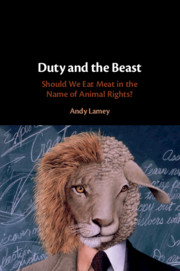Book contents
- Duty and the Beast
- Duty and the Beast
- Copyright page
- Contents
- Acknowledgments
- Introduction: The New Animal Debate
- Chapter 1 The Case for Animal Protection
- Chapter 2 A View to a Kill
- Chapter 3 Burger Veganism
- Chapter 4 The Dinner of Double Effect
- Chapter 5 Killing Them Softly
- Chapter 6 What Is It Like to Be a Chicken?
- Chapter 7 The Logic of the Larder
- Chapter 8 Thinking Like a Plant
- Chapter 9 Long Live the New Flesh
- Bibliography
- Index
Chapter 3 - Burger Veganism
Published online by Cambridge University Press: 25 March 2019
- Duty and the Beast
- Duty and the Beast
- Copyright page
- Contents
- Acknowledgments
- Introduction: The New Animal Debate
- Chapter 1 The Case for Animal Protection
- Chapter 2 A View to a Kill
- Chapter 3 Burger Veganism
- Chapter 4 The Dinner of Double Effect
- Chapter 5 Killing Them Softly
- Chapter 6 What Is It Like to Be a Chicken?
- Chapter 7 The Logic of the Larder
- Chapter 8 Thinking Like a Plant
- Chapter 9 Long Live the New Flesh
- Bibliography
- Index
Summary
Steven Davis has offered an influential argument for the view that the diet most consistent with animal protection philosophy is one that contains some meat. Davis cites the accidental death of field animals during vegetable harvesting. Empirical studies suggest that the number of field mice, rats, and similar creatures killed in crop cultivation may outnumber the total animal deaths involved in the raising of beef cattle, so long as the cows are raised on a diet of grass rather than grain. If so, then the most logical diet for animal advocates to adopt is one that includes hamburger and milk from grass-fed cows, in order to reduce the overall number of animals killed. Davis's argument for burger veganism overlooks philosophically significant forms of harm to human beings that are present in beef production but not vegetable harvesting, and bases his argument on the implausible assumption that there is no difference between deliberate and accidental killing. A final problem bedevils not only Davis’s orginal argument but subsequent variations that defend eating Australian red meat and roadkill. It is that more than one current trend in plant agriculture causes little or no collateral harm to animals.
Keywords
- Type
- Chapter
- Information
- Duty and the BeastShould We Eat Meat in the Name of Animal Rights?, pp. 61 - 91Publisher: Cambridge University PressPrint publication year: 2019

